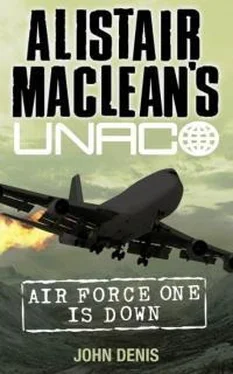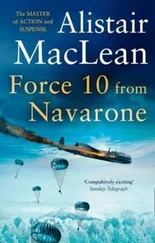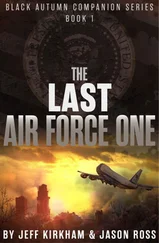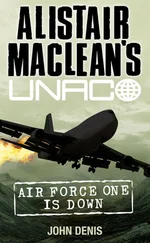‘How long?’ Fairman rasped.
‘Most of five thousand feet,’ Jagger confirmed.
‘Most?’
‘Uh-huh. The strip was built for jets, but not very big ones.’
‘It’s impossible,’ Fairman protested.
Jagger shook his head. ‘Good, old-fashioned airmanship, Tom. But mind the gully at the far end.’
‘Gully!’
‘Yeah. The runway sort of – well, peters out. It’s quite a deep drop.’
‘Jesus Christ.’
Jagger smiled and said, ‘Maybe a prayer would help.’
Kowalski remarked that there was an island coming up to port.
‘Well don’t tell us,’ Latimer remarked peevishly, ‘you’re the navigator. What is it?’
If they were on course, Kowalski explained, it would be the island of Vis.
‘See any others?’ he asked.
‘To where?’
‘Starboard.’
Latimer probed the blackness, and identified two shapes looming on the right. He passed the news to the navigator.
‘Spot on,’ Kowalski said, ‘the first one’s Hvar and the second Brac. It’s dead straight now until landfall.’
‘Gee, thanks,’ Fairman said.
The Commander requested further details from Jagger of the landing strip. The runway itself, the ringer told him, would be marked by paraffin flares. Fairman’s jaw dropped.
‘You did say paraffin flares?’
‘Sure. They’re very effective in fog.’
‘It isn’t foggy,’ Latimer pointed out.
‘Don’t bet on it,’ Jagger replied, ‘they get funny weather around here.’
Fairman sighed and said, ‘Go on.’
Jagger grinned and assured the Commander that the worst of the bad news was over.
‘That was the primitive aspect,’ he added. ‘Beyond that they’re quite well equipped. They have a transponder there which operates on your radar frequency, so you’ll be able to pinpoint the exact position. They’ve also got VHF radio – battery-powered, naturally – and they’ll use that to keep you abreast of conditions on the ground.’
‘They speak English, then,’ Fairman inquired acidly, ‘not ancient Sumerian or Stone Age grunt language?’
‘One of them almost certainly speaks all three.’
Latimer asked if, assuming they were almost there, the plane could have back its VHF radio for tuning to the correct frequency.
‘Sure, Pat,’ Jagger replied, ‘you can have the radio, but I’ll do the tuning. The less you know the better.’
Holding a headset to his ear with his free hand, Jagger adjusted the frequency to 118.1 and made contact with the Kosgo base. He handed the communicator to Fairman. The Commander heard a precise and cultured English voice recite all the details he needed to know: the runway-heading, atmospheric pressure reading at aerodrome level, and the wind speed and direction.
‘Do call again,’ Smith added, ‘when the transponder blip indicating the exact position of the airfield appears on your screen.’
Fairman grunted and surrendered the headphones to Jagger, who signed off.
‘Happier?’ the ringer said.
Fairman ignored him and told Latimer, ‘We’ll drag her in low and slow. When the blip comes on I’ll take the controls and try it at about 110 knots. Then we’ll coast in and snatch it back to manual if – or, I hope, when – we spot the lights.’
The Boeing ran for a further twenty miles at 250 feet, straight as a die to Kowalski’s immense satisfaction, when the green spot started glowing on the weather radar screen.
‘Tell your friends we have them on visual,’ Fairman instructed Jagger, unconsciously treating him as part of the normal complement of Air Force One – which indeed, as far as Fairman was concerned, he was, although not on the flight deck. When Jagger had passed on the intelligence, Fairman added, without turning to look at the ringer, ‘If you know what you’re doing, you’ll keep out of the way for the next ten, fifteen minutes.’
Jagger held on to the back of Fairman’s seat as the plane bucked, and moved the point of his gun until the short hairs on the back of the Commander’s neck erected of their own volition, though the metal had not touched him.
‘Listen, Tom,’ Jagger purred, ‘if you don’t land this aircraft, I will.’
‘That,’ said Latimer, ‘I should like to see.’
‘But you wouldn’t see it, Pat, that’s the point,’ Jagger replied smoothly. ‘You’d all be dead.’
Silence fell on the crew and they concentrated perhaps too minutely on the task in hand. Jagger had rammed the message home, and not one among them doubted that he meant what he said …
Sabrina closed the door of the galley after slipping the catch of the lock. At least Wynanski and Jeanie were still alive, though she calculated they would not regain consciousness for some time. But who had done it? And why? And what could she do about it?
Clutching every support – walls, furniture – that came to hand, she struggled back to the stateroom with the tooled leather first-aid kit in her hand. Dr Hamady, who had unbuckled his seat-belt and was crouching solicitously over the crippled Zeidan and his grandson, leapt to help her as she lost her balance and crashed against a table. They remained precariously rooted to the floor, until Hamady realised that they were no longer bending over to compensate for the steeply-inclined angle of the plane.
Sabrina straightened and gasped with relief.
‘So,’ said Dorani from his seat, ‘we have ceased to dive.’
Sheikh Arbeid, the taciturn Iraqi, placed a cup on the polished surface of the table before him. It rattled slightly, but stayed in position. He grunted confirmation.
Sabrina hurried to Sheikh Zeidan and gently released his hold on the boy, who was now almost unconscious. She loosened his seat-belt, then unzipped the trousers of Feisal’s immaculate grey suit. Zeidan gripped the arm of his wheelchair with his left hand, and with the other took the boy’s legs on his lap until he was fully stretched. Sabrina pulled down his trousers and underpants, pinched and swabbed a patch of flesh on the boy’s small, taut buttock, and injected a dose of insulin.
Almost immediately, Feisal’s feverish mutterings ceased and his breathing became calmer. Zeidan carefully patted the beads of perspiration from his grandson’s face, and whispered in Arabic, ‘Sleep, my jewel, my prince.’
All the OPEC ministers and their aides had now resumed their seats, and Hamady, who had courteously waited for the medication to be finished, fixed Hawley Hemmingsway with an angry glare.
‘You mentioned some time ago, Minister,’ he said, ‘that you would endeavour to discover why we have been put to this considerable danger, let alone discomfort. If you do not accept that we have been placed in peril, I would urge you to consider that His Excellency Sheikh Zeidan’s grandson could still become gravely ill. I think you owe us an apology and a full explanation.
‘I can speak only for the Monarch and Government of Saudi Arabia, but for my part I assure you that we shall feel inclined to accept neither the apology nor the explanation unless they are completely satisfactory, and the situation is restored immediately to normality. As for the oil accord, in the service of which we have undergone this humiliating experience … well, I leave that to your imagination, Mr Hemmingsway.’
The American Energy Secretary sat stunned and silent. Then he breathed a sigh and nodded his head slowly.
‘Clearly, Dr Hamady, gentlemen,’ he said, ‘I have no more idea than you do what is going on. I now propose to find out.’
He rose from the seat, and his eyes met Sabrina Carver’s. He read in them the clear message of warning and danger, reserved at the moment for him alone, though Zeidan, watchful as ever, had caught the interchange.
Читать дальше
Конец ознакомительного отрывка
Купить книгу










